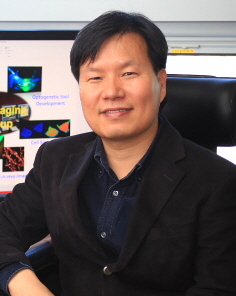Researchers at the Institute for Basic Science (IBS) in South Korea have succeeded in developing the world’s first technology to control specific protein functions in living cells by using lights, which may be useful in future cancer cell research.
 |
|
Leader of the Bio-imaging Research Group at IBS Won Do Heo. (All photo courtesy belong to IBS) |
IBS has announced that the Bio-imaging Research Group, led by Won Do Heo, both a group leader from the Center for Cognition and Sociality, and a professor at the College of Life Science and Bioengineering at the Korea Advanced Institute of Science and Technology (KAIST), has developed the Light-Activated Reversible Inhibition by Assembled Trap (LARIAT).
With the LARIAT, when cells are exposed to visible blue light from LED lamps, protein clusters are formed within the cells. This allows the target proteins trapped inside to inactivate protein functions.
The research group has found that this technology allows scientists to inactivate critical biological phenomena, including cell migration and cell division, by using only lights, and without the assistance of chemical drug treatments or genetic modification. The whole process can be managed by simply changing the lighting that the cell is exposed to.
 |
|
IBS Researcher Sangkyu Lee. |
Researchers are hoping that this technology, which could make it possible to cease cell division, can be applied in future cancer cell and signal transduction research.
“We are already conducting research on the spread of cancer, as well as brain science in animal models with the LARIAT,” professor Heo says. “I believe this technology will be a breakthrough in investigating cancer treatments and the function of neurons in a complex neural network, which existing technologies have not been able to do.”
The research results will be published in the June issue of Nature’s sister journal, Nature Methods, a prestigious journal in the category of biochemical research methods.
* Title of paper: “Reversible Protein Inactivation by OptogeneticTrapping in Cells”













